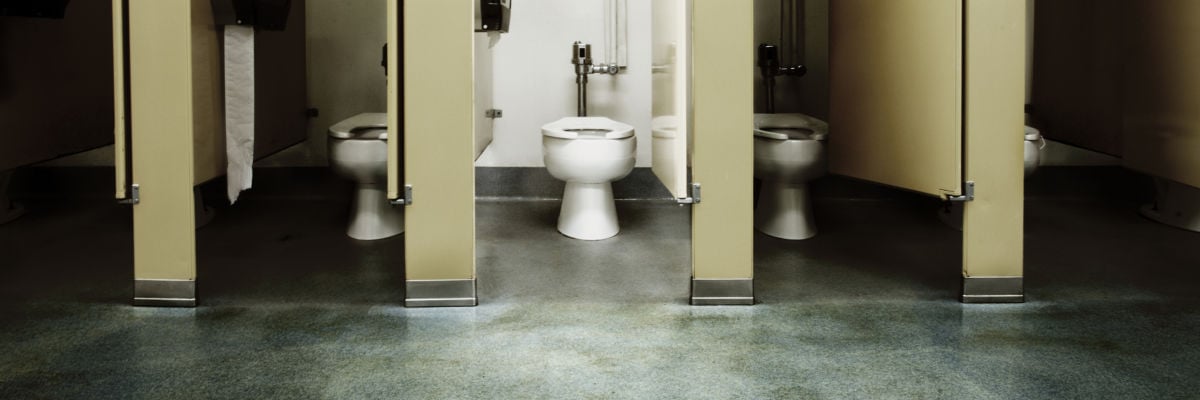
By now you’ve probably heard about celebrities and companies standing up to discrimination and human rights abuses taking place all over the world. Rock star Bryan Adams just canceled a show in the United Arab Emirates, where apostasy from Islam is punishable by death. Bruce Springsteen followed suit and refused to play in Egypt, where domestic violence is not a crime. The National Basketball Association refused to play exhibition games in China. Financial giant PayPal will move its headquarters from Singapore to a country that doesn’t flog people for littering.
Oh, wait—the opposite has happened.
Adams and Springsteen recently played concerts in the aforementioned human-rights-ignoring countries, and the NBA and PayPal ignore the harsh practices in China and Singapore where they currently do business. But what these performers and companies absolutely can’t stand is that the state of North Carolina just passed a law saying that men may use only male restrooms and locker rooms, and women may use only female restrooms and locker rooms.
Springsteen canceled his North Carolina concert. (Adams wasn’t scheduled to play there, but he canceled a concert in Mississippi after that state passed a religious liberty bill that allows people to deny wedding services to same-sex couples.) Paypal withdrew its plans for expansion in the state and the estimated 400 jobs that was to entail. The NBA threatened—only threatened, at least as of this writing—to yank its 2017 All Star Game out of Charlotte.
The bill and the Boss
Here I am going to focus on the bathroom requirement in the recent North Carolina law, since that seems to be driving most of the media furor. The bill says, “Public agencies shall require every multiple occupancy bathroom or changing facility to be designated for and only used by persons based on their biological sex.” The term “biological sex” refers to “the physical condition of being male or female, which is stated on a person’s birth certificate.”
Springsteen explained on his website why he canceled a performance in the state: “HB2—known officially as the Public Facilities Privacy and Security Act—dictates which bathrooms transgender people are permitted to use.” He says this and other aspects of the law are “an attempt by people who cannot stand the progress our country has made in recognizing the human rights of all of our citizens to overturn that progress.”
But since the law already dictates which bathrooms men and women are permitted to use, why not pass a bill that dictates which bathrooms transgender people may use? Why not treat transgender people like people who are cisgender (the term for those whose sexual identity matches their biology) and tell them which public facilities are appropriate for them to use?
It’s discrimination!
Some people shut down discussion of HB2 by saying it is “discriminatory.” They hope the dreaded “d-word” will strong-arm levelheaded people to move against the bill.
But what’s wrong with being discriminatory? Discrimination simply means you notice a difference between two things and treat one differently than the other because of that difference.
For example, laws that prohibit men from using women’s locker rooms (and vice versa) discriminate. They notice that men are different than women and use that difference as the basis to treat men differently or, in this case, deny them access to certain facilities. If all discrimination were wrong, then you couldn’t have any segregated bathrooms or locker rooms.
It’s not discrimination that’s the problem: it’s unjust discrimination that’s the problem.
Jim Crow laws that prohibited minorities in this country from using white locker rooms and forced them to use their own facilities didn’t just discriminate, they unjustly discriminated. They used a morally irrelevant trait like race to justify unequal treatment and segregation. The same would be true for restaurants that deny women service so that male customers could have “man-time.” In this case, the difference between men and women is not morally relevant to the restaurant’s unequal treatment of women or the potential harm of such discrimination.
However, as with segregated locker rooms, discrimination can be morally justified if it has a rational basis. What about the North Carolina bathroom bill? Common sense should (but, unfortunately, often does not) tell people that men and women have morally relevant differences that races or nationalities do not. They are often sexually attracted to one another or, at least, experience feelings of deep discomfort when they are forced to disrobe or engage in excretory functions near one another. Therefore, the common good is best served by segregating men and women in places where intimate bodily functions or disrobing occurs.
Indecent exposure
Now, someone might argue that he has a good reason to use the changing facility of another sex and so such discrimination is unjustified. Consider a meek, 13-year-old boy who is routinely bullied in the male locker room. He may wish to use the girl’s locker room because he does not want to be physically intimated. Let’s say further that he has deep-seated same-sex attraction. He could argue that the girls should not feel uncomfortable around him, since he isn’t sexually attracted to them.
But it should be clear that girls are justified in being uncomfortable in the presence of a nude or seminude post-pubescent boy, and their right to privacy outweighs the boy’s desire to be comfortable. In fact, all states have laws that ban this kind of “indecent exposure” between men and women. This fact also highlights a glaring problem with solutions from critics of HB2 that allow people to use facilities that match their “gender identity” and not their biological anatomy.
Let’s suppose the law is amended so critics get their wish: a person is allowed to use any public facility, including restrooms and locker rooms, on the basis of gender identity and not biological sex. Now, what do we do about section 14-190.9 of the North Carolina penal code? It says, “Any person who shall willfully expose the private parts of his or her person in any public place and in the presence of any other person or persons, except for those places designated for a public purpose where the same sex exposure is incidental to a permitted activity . . . shall be guilty of a Class 2 misdemeanor.”
If a man exposes himself to two boys walking home from school, he would be guilty of indecent exposure (and possibly other crimes, since his victims were minors). If he exposes himself in the process of changing in a male locker room, he would not be guilty, since that occurred in a “place designated for a public purpose where the same sex exposure is incidental.” But if he waltzed into a female locker room and changed in front of a group of girls or women, he would be guilty of indecent exposure. How does his guilt change if the man says he identifies as a woman?
Keep in mind that this is not a mere hypothetical example. A few years ago a group of teenage girls came across 45-year-old Colleen Francis exposing “her” male genitals in the sauna of a public locker room. Whether the possessor of male genitals identifies as a man or as a woman, the women in the locker room are still exposed to the sight of male genitals, and that is what justifies indecent exposure laws. How does the fact that the possessor of male genitals may think he’s a woman, or the king of France, or any other distortion of reality, change that reality?
(A critic might say that the women in the locker room scenario have no right to be upset because they have seen only incidental “female” nudity that, because of the person’s transgender status, happens to consist of male genitals. Therefore, the exposure is not indecent in nature. All I can say is that this kind of semantic gymnastics deserves an Olympic gold medal.)
While those who identify as transgender do face injustices in life, including in some cases heinous acts of violence, that does not justify allowing people to use a restroom or locker room based solely on their personal sense of identity. Segregated restrooms and changing facilities do not exist to separate people who think they are men from people who think they are women. They exist to separate people with a male anatomy from people with a female anatomy.
The fact that some transgender people look a lot like the sex they are imitating, and may even go unnoticed in the opposite sex’s facility, does not change the general necessity of segregating male and female bodies from one another. Otherwise, we should allow women who look like men, even if they don’t identify as men, to use male facilities, if that makes them more comfortable. But if anyone can use a facility because it makes them the most comfortable (e.g., the meek 13-year-old boy I mentioned earlier), then the general comfort, not to mention the right to privacy and even safety, of everyone is undermined.
Transgender people could have their discomfort eased with the construction of single-use facilities, which would also help those who are uncomfortable being nude in front of anyone. They could also be granted exemptions that allow them them to use facilities of the opposite sex after they have completed sex reassignment surgery. While I don’t support this kind of surgery, it is a compromise the law could allow in order to balance everyone’s rights and preferences.
But we should not completely redefine concepts like male and female with language so ambiguous that it will inevitably lead to, in the words of the radical feminist Donna Haraway, “the utopian dream of the hope for a monstrous world without gender.”



